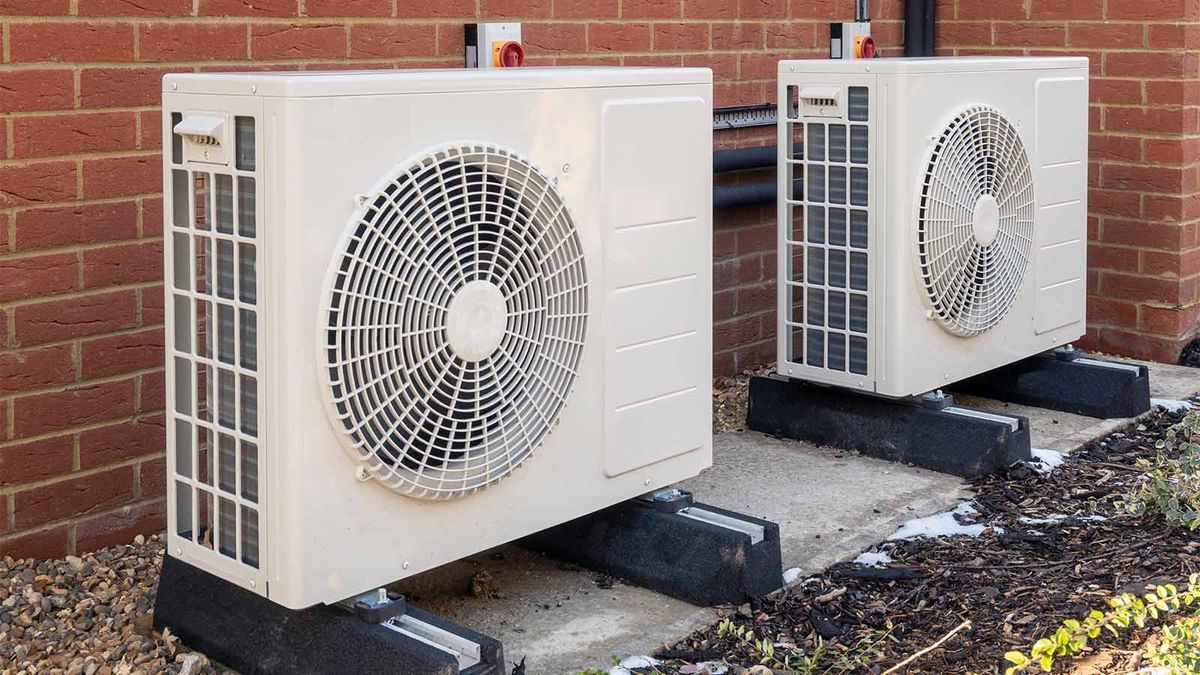Yes I only have ducts on the main floor .Well of course that's how modern buildings and houses are going and many retrofit their homes that way if possible even if they've got older less efficient furnaces. The problem with places that are pretty much exclusively baseboard is that there's no existing ducting per se for a heat pump to make use of.
April Fools!! Here's your Carbon Tax F#ckers!!!
- Thread starter Ron in Regina
- Start date
You are using an out of date browser. It may not display this or other websites correctly.
You should upgrade or use an alternative browser.
You should upgrade or use an alternative browser.
I'm aware of a number of places that are. And some that are 'primarily' heated that way with a 'secondary' heat source like a wood burning fireplace etc. that provides some of the heat.I was just curious to see how you could afford it. Not questioning your financial situation but comparing it to the options, if you where straight up completely electric heating.
And of course a lot of apartment buildings are still heated that way in each individual unit. Most i would think.
Electricity used to be stupid-cheap in BC, and it's still far less than many other places. So you still see it. But it's the most expensive method to heat that's out there currently.
BC. Over 90% of our power is water generated. Never gets to 40 below on the lower coast. Although with the moisture and wind chill it can feel much colder.Hydro Electric for heat? Where do you live that that’s affordable? Do you get that -40°C wherever you are?
Hell, over 90% of everybody's power is water generated. That's what steam turbines run on.BC. Over 90% of our power is water generated. Never gets to 40 below on the lower coast. Although with the moisture and wind chill it can feel much colder.
WE put a mini split in about 4 winters back to cut out wood. Propane for back up. Still have a fireplace but don't use it much. By taking the insert out of it we cut insurance costs by $400/year. That pays about 3 months of propane and is much cleaner.Baseboard heaters? Too fucking inefficient. Reality?
Heat pumps.

How Does a Heat Pump Work?
Heat pumps use a small amount of energy to move heat from one place to another. But is one right for your home?home.howstuffworks.com
Your stupid is showing again. Generators do not require steam. Just add water and watch the electrons flow.Hell, over 90% of everybody's power is water generated. That's what steam turbines run on.
So, water generated.Your stupid is showing again. Generators do not require steam. Just add water and watch the electrons flow.
Thanks.
The only forms of energy generation in which water is not a key component of the generation (usually as a transfer fluid) are little putt-putt gas or diesel generators, wind, and solar.That is what hydro means. Well, technically it would be hydraulic, but that just confuses people that think hydraulic means oil.
For hydro power water isn't a transfer fluid. It is the driving force. Gravity and volume is the only other consideration. Basically, it is either hi volume, low pressure or low volume, high pressure. The last hydro electric project I worked on, the power tunnel is42 ft dia. According to the engineers, the water moves at about walking speed. Only a couple hundred feet drop. The one before that has 2200 ft. drop. Nozzles on the turbine are about the size of a finger and around 1200psi.The only forms of energy generation in which water is not a key component of the generation (usually as a transfer fluid) are little putt-putt gas or diesel generators, wind, and solar.
You are correct. That's why I said "usually as a transfer fluid."For hydro power water isn't a transfer fluid. It is the driving force. Gravity and volume is the only other consideration. Basically, it is either hi volume, low pressure or low volume, high pressure. The last hydro electric project I worked on, the power tunnel is42 ft dia. According to the engineers, the water moves at about walking speed. Only a couple hundred feet drop. The one before that has 2200 ft. drop. Nozzles on the turbine are about the size of a finger and around 1200psi.
In this usage, "usually" means "in most but not all cases."
Hope that helped.
Hell, over 90% of everybody's power is water generated. That's what steam turbines run on.
Back peddling again I see .You are correct. That's why I said "usually as a transfer fluid."
In this usage, "usually" means "in most but not all cases."
Hope that helped.
Wood is messy and smokey. Even shittier if you bring a log in that yellow jackets were snoozing in.WE put a mini split in about 4 winters back to cut out wood. Propane for back up. Still have a fireplace but don't use it much. By taking the insert out of it we cut insurance costs by $400/year. That pays about 3 months of propane and is much cleaner.
Sorry buddy. Pizza laws of physics dont not apply.The only forms of energy generation in which water is not a key component of the generation (usually as a transfer fluid) are little putt-putt gas or diesel generators, wind, and solar.
Steam is a gas.
Well the positioning of the unit isn't the issue, the issue is distribution inside the home. There are so-called "Ductless" models but they're not really suitable for significant spaces.In those cases its exterior wallmounted units. There is a push to make AC part of building codes which shores up the heat pump addition to code for your heat source..
Builders in the lower mainland are all moving to including "plumbing" for heat pumps and air conditioners so that owners can put one in if they wish without breaching the building warranty and i'm hoping the codes will change to make provisions mandatory.
Don't feed the stupid. I don't know why but his posts have been getting less and less intelligent by the day lately. Imagine claiming that water provides most of the world's power because steam. I mean you might as well claim that gravity provides our power because without it the power stations would float away.Sorry buddy. Pizza laws of physics dont not apply.
Steam is a gas.
He's bringing nothing to the conversation these days which is weird. Just ignore him till he smartens up again.
Go easy on him...He is just over stressed about the election today.Don't feed the stupid. I don't know why but his posts have been getting less and less intelligent by the day lately. Imagine claiming that water provides most of the world's power because steam. I mean you might as well claim that gravity provides our power because without it the power stations would float away.
He's bringing nothing to the conversation these days which is weird. Just ignore him till he smartens up again.
So why is carbon pricing failing as a policy? At least five reasons.

 apple.news
First, it is very visible, leads to higher prices for necessities (transportation and heating), and hurts low-income and rural voters. Hidden taxes and even costly regulations on businesses are politically easier: voters don’t see them raising prices, even though they do.
apple.news
First, it is very visible, leads to higher prices for necessities (transportation and heating), and hurts low-income and rural voters. Hidden taxes and even costly regulations on businesses are politically easier: voters don’t see them raising prices, even though they do.
Second, voters like policies that give them money rather than take it away. Outside California the U.S. has very little carbon pricing. But Washington just passed legislation providing almost a half-trillion dollars in climate subsidies. Subsidies financed by higher deficits or corporate taxes are more appealing than taxes — until they break the bank.
Third, many countries have little faith in the effectiveness of carbon pricing, actually preferring clean energy regulations and mandates. Even Jonathan Wilkinson, when he was environment minister, was convinced that even with the carbon price rising to $170 per tonne mandates and clean fuel regulations were needed if Canada was to reach its (unrealistic) GHG emission targets by 2030.
Fourth, without international coordination carbon policies have significant impacts on competitiveness that could lead to deindustrialization and job losses in energy-intensive industries. For Canada, this is especially important. Our carbon policies are on a different track than those of our largest trading partner, the U.S. Even if we match the Americans’ huge new subsidies, our high carbon price will make Canadian businesses less competitive than U.S. companies. Border tariffs with the U.S. might offset our disadvantage but wouldn’t stop Canadian businesses shifting production south to the largest market in the world.
Fifth, energy security and poverty will force countries to trade off climate change with other public objectives until practical technologies develop commercially. In today’s energy crisis, European countries are scrambling for coal, natural gas and oil to support both consumers and industries.
Though it does bring in revenues, which is always appealing to governments, carbon pricing just doesn’t cut it for many countries, as the OECD has now shown.
Jack Mintz: The real climate policy question — why is the carbon tax so low? — Financial Post
Though it does bring in revenues, carbon pricing just doesn’t cut it for many countries
Second, voters like policies that give them money rather than take it away. Outside California the U.S. has very little carbon pricing. But Washington just passed legislation providing almost a half-trillion dollars in climate subsidies. Subsidies financed by higher deficits or corporate taxes are more appealing than taxes — until they break the bank.
Third, many countries have little faith in the effectiveness of carbon pricing, actually preferring clean energy regulations and mandates. Even Jonathan Wilkinson, when he was environment minister, was convinced that even with the carbon price rising to $170 per tonne mandates and clean fuel regulations were needed if Canada was to reach its (unrealistic) GHG emission targets by 2030.
Fourth, without international coordination carbon policies have significant impacts on competitiveness that could lead to deindustrialization and job losses in energy-intensive industries. For Canada, this is especially important. Our carbon policies are on a different track than those of our largest trading partner, the U.S. Even if we match the Americans’ huge new subsidies, our high carbon price will make Canadian businesses less competitive than U.S. companies. Border tariffs with the U.S. might offset our disadvantage but wouldn’t stop Canadian businesses shifting production south to the largest market in the world.
Fifth, energy security and poverty will force countries to trade off climate change with other public objectives until practical technologies develop commercially. In today’s energy crisis, European countries are scrambling for coal, natural gas and oil to support both consumers and industries.
Though it does bring in revenues, which is always appealing to governments, carbon pricing just doesn’t cut it for many countries, as the OECD has now shown.
